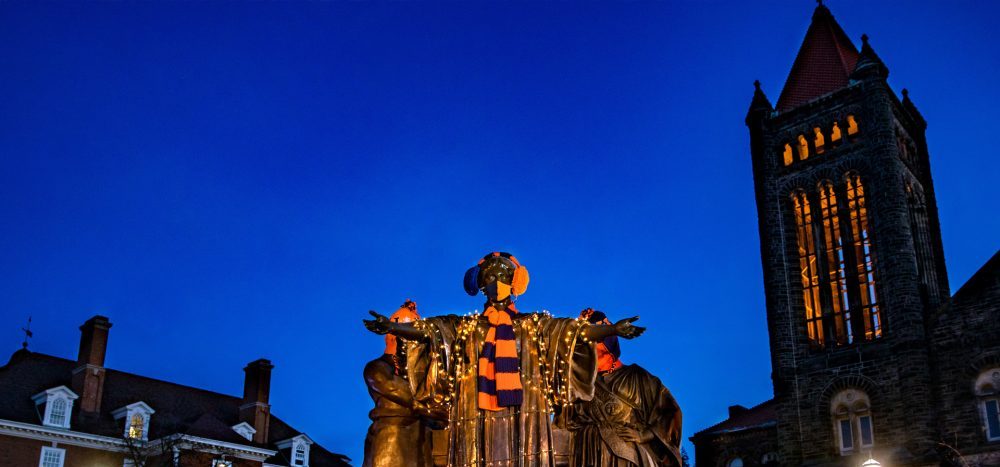Symplectic structures originated from the geometric formulation of classical mechanics. Nowadays, symplectic geometry is a central field in Mathematics with many connections with other fields, both in and outside Mathematics. This course presents an introduction to the foundational tools, ideas, examples and theorems of symplectic geometry. It is intended for PhD students studying symplectic geometry, Poisson geometry, and symplectic topology, as well as students in related areas such as dynamical systems, algebraic geometry, complex geometry, low dimensional topology and mathematical physics. The course covers the local and global structure of symplectic manifolds, their submanifolds, the special automorphisms they support (Hamiltonian flows), their natural boundaries (contact manifolds), their special geometric features (almost complex structures), and their symmetries. Students taking this course are assumed to know differential geometry at the level of Math 518 – Differentiable Manifolds.
Lecturer:Rui Loja Fernandes
Email: ruiloja (at) illinois.edu
Office: 346 Illini Hall
Office Hours: Mondays and Fridays 1.30-2.30 pm (or by appointment);
Class meets: MWF 9:00-9:50 AM, 447 Altgeld Hall;
Prerequisites: Math 518, or equivalent.
In this page:
- Announcements
- Syllabus
- Textbooks
- Grading Policy and Exams
- Homework Assignments
- Emergency information for students in Mathematics courses
Announcements:
- Last of day of instruction for this class is Friday, Dec 6.
- I have made available slides with a brief tour of Poisson Geometry.
Syllabus:
- Linear Symplectic Geometry:symplectic forms, examples and constructions, Darboux’s Theorem, Lagrangian submanifolds, Weinstein’s tubular neighborhood theorem, blowing up and down, symplectic cuts and sums.
- Symplectic Manifolds: symplectic forms, examples and constructions, Darboux’s Theorem, Lagrangian submanifolds, Weinstein’s tubular neighborhood theorem, blowing up and down, symplectic cuts and sums.
- Symplectomorphisms: fixed point theorems, Hamiltonian flows, Poisson brackets, integrable systems, the group of symplectomorphisms.
- Contact Manifolds: Contact structures, contact forms, Gray’s theorem, Reeb flows.
- Almost Complex Structures: almost complex structures, integrability, complex manifolds, Kahler forms, compact Kahler manifolds.
- Hamiltonian Group Actions and Reduction: group actions, moment maps, Marsden-Weinstein-Meyer reduction, toric manifolds.
- Advanced Topics (to be determined by instructor and student interests)
Textbooks:
- Ana Cannas da Silva, Lectures on Symplectic Geometry, LNM 1764, Springer-Verlag, Berlin, 2001. An errata is available here.
- Dusa McDuff and Dietmar Salamon, Introduction to Symplectic Topology, Oxford graduate texts in mathematics 27, Oxford University Press, 2017.
Grading Policy
- Homework and Expository Paper: I will assign homework every other week, from the first reference above. Students will also be required to write (in LaTeX) and present a paper. The papers will be due by the last week of classes. Presentations will be in class, during the last week of classes.
Homework Assignments, Lecture Notes and Sections covered so far:
All homework sets are from the book by Cannas da Silva:
- Homework set #1: (due Friday, Sep. 6):
- HW1 Problems 7, 8, 9;
- HW2 Problem 2;
- HW3 Problems 1, 2, 3;
- Homework set #2: (due Monday, Sep. 20):
- HW5 Problems 2, 3;
- HW6 Problems 1, 2, 3;
- Homework set #3: (due Monday, Oct. 21):
- HW7 Problems 1, 2, 3, 4;
- Homework set #4: (due Monday, Nov. 18):
- HW10 Problem 1;
- HW12 Problems 1-7;
Lecture Notes (Disclaimer: this contains mistakes! Better read the book…)
- 1. Introduction. Linear symplectic geometry;
- 2. Symplectic manifolds: first examples;
- 3. Submanifolds of symplectic manifolds;
- 4. Symplectomorphism and generating functions;
- 5. Local normal form: Darboux’s Theorem;
- 6. Moser’s Path method;
- 7. Neighborhood Theorems;
- 8. Tubular Neighborhood Theorems;
- 9. Symplectic and Hamiltonian vector fields;
- 10. Contact Structures;
- 11. Contact Vector Fields and Reeb Vector Fields;
- 12. Symplectic versus Contact Geometry;
- 13. Almost complex structures;
- 14. Almost complex manifolds;
- 15. Kahler Structures;
- 16. Integrable systems and lagrangian fibrations;
- 17. Symplectic quotients and hamiltonian group actions;
- 18. Poisson geometry;
- Slides with a brief tour of Poisson Geometry.
Sections of the book covered so far: 1.1-1.4; 2.1-2.4; 3.1-3.4; 4.1.-4.3; 5.1, 7.1-7.3, 8.1-8.3, 9.1-9.4, 10.1-10.3, 11.1-11.3, 12.1-12.3, 13.1-13.3, 14.1-14.3, 15.1-15.3, 16.1-16.4, 17.1-17.4, 18.1-18.4, 21.1-21.5, 22.1-22.4, 23.1-23.3.
(PDF files can be viewed using Adobe Acrobat Reader which can be downloaded for free from Adobe Systems for all operating systems.)
Emergency information for students in Mathematics courses
For important emergency information related to fires, tornados or active threats, please look at the following leaflet and emergency instructions.
Last updated December 6, 2019.

